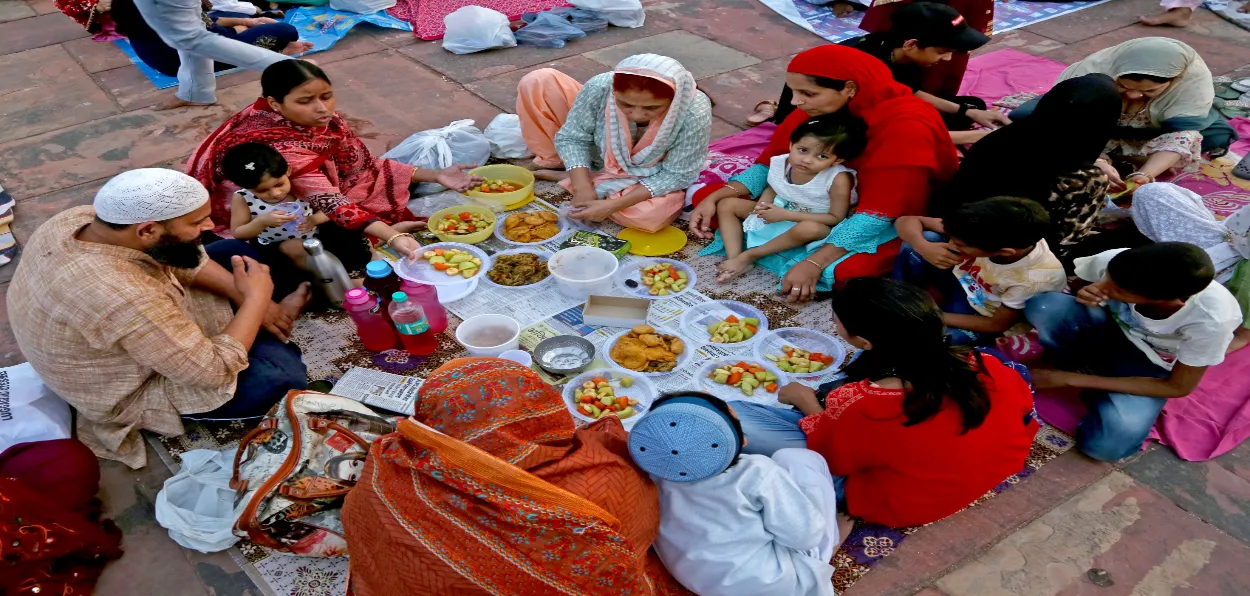
Eman Sakina
Ramzan, the ninth month of the Islamic lunar calendar, holds great significance for Muslims worldwide. It is a time of spiritual reflection, heightened devotion, and increased worship.
Fasting during the month of Ramzan is one of the greatest acts of worship a believer can perform. It is an act that cleanses one’s mind, body, and soul from the spiritual and physical impurities of this world. It is an act that brings the hearts of Muslims together on a worldwide level as they endeavor to practice the virtue of self-discipline in unison. And it is an act that satiates the hungry soul of its eagerness to please the Lord of the Worlds.
The act of fasting was also practiced by previous religious communities. Likewise, it has been ordained for the followers of the Prophet Muhammad. Allah All-Mighty says in the Quran, “O ye who believe! Fasting is prescribed onto you as it was prescribed onto those before you, that perhaps ye may (learn) self-restraint.” [Surat Al-Baqara, v. 183]. Here is a comprehensive guide to understanding the essentials of fasting in Ramadan.
The Purpose of Fasting:
Fasting during Ramadan is not merely about abstaining from physical needs; it serves as a means of self-discipline, spiritual reflection, and empathy for those less fortunate. It fosters a sense of community, as Muslims worldwide collectively engage in this act of worship.
Timing of Fasting:
The fasting period begins with Suhoor, a pre-dawn meal eaten before the Fajr (dawn) prayer. It concludes with Iftar, the evening meal to break the fast at sunset, following the Maghrib prayer. It is essential to adhere to these timings as prescribed by Islamic teachings.
Abstentions During Fasting:
During the fasting hours, Muslims refrain not only from food and drink but also from smoking, marital relations, and sinful behavior. Additionally, it is crucial to maintain control over one's speech and actions, avoiding negativity and conflict.
Exceptions and Exemptions:
Certain individuals are exempted from fasting, including children, the elderly, travelers, pregnant or nursing women, and those who are ill or menstruating. However, those who are temporarily exempted are often encouraged to make up for missed fasts later or provide charity instead.
‘From individuals who are permitted to fast’ means that one must be free from a situation that would prevent the validity of one’s fast, such as menstruation or lochia (post-natal bleeding). Sick people and women who are pregnant or breastfeeding are obliged to fast. However, illness can excuse a person from fasting if one reasonably fears that the act of fasting would increase the sickness or slow the recovery process. The same ruling applies to a woman who is pregnant or breastfeeding and reasonably fears that fasting will harm her or her baby.
A traveler is also excused from fasting if he initiates his journey before the time of Fajr enters.
All the aforementioned individuals are obliged to make up their missed fasts once Ramadan has ended at a time that they can. There is no expiation for a person who delays making up their missed fasts, though it is superior to make them up immediately if they are able.
The Importance of Intention (Niyyah):
Intention plays a crucial role in fasting during Ramadan. Muslims must have the intention to fast before dawn each day. This intention can be made silently in one's heart and is necessary for the fast to be valid.
Spiritual Practices and Reflection:
In addition to abstaining from physical needs, Ramadan is a time for increased prayer, recitation of the Quran, and acts of charity (Zakat). Many Muslims also engage in additional acts of worship, such as Taraweeh prayers performed at night in congregations at mosques.
Breaking the Fast (Iftar):
The moment of breaking the fast, known as Iftar, is a time of joy and gratitude. Traditionally, Muslims break their fast with dates and water, following the Sunnah (traditions) of the Prophet Muhammad. This is followed by a meal consisting of various foods, often shared with family and friends.
Fasting during Ramadan is a deeply meaningful spiritual practice that holds great significance in the lives of Muslims worldwide. It is a time of self-reflection, devotion, and community bonding. Understanding the rules, practices, and spiritual dimensions of fasting in Ramadan enriches one's appreciation of this sacred observance. As Muslims embark on this journey of self-discipline and spiritual growth, may the blessings of Ramzan illuminate their hearts and souls.
